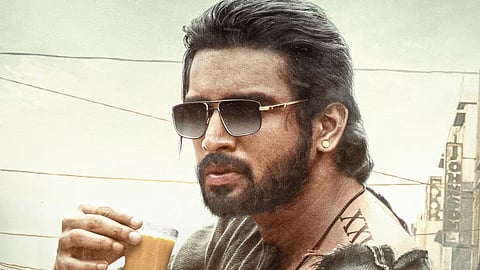

Ronny ambitiously attempts to blend the glitzy sheen of gangster dramas with a raw, human quest for redemption. The film opens with a familiar mantra—"Violence, Violence, Violence"—but later introduces its twist to the popular line from the KGF franchise.
The story begins with Kaali (Ravi Shankar), a gangster who has dominated the criminal underworld for a decade, demanding that a film be made based on his life. He envisions his story as a grand action film and recruits a director (Sujay Shastry) to bring this vision on screen. Kaali recounts his troubled past—his disdain for his mother’s desire for a normal life and his obsession with ruling the gangster world—in a way that explains his background.
The film then introduces Ronny (Kiran Raj) with the cliched yet effective combination of a beer bottle and a cigarette. Kiran Raj’s transition from serials to the silver screen is notable; his physical presence and delivery add a raw energy to Ronny that suggests transformation. The film’s true character exploration emerges through Ronny’s two closest friends, who unravel his duality and provide a back-and-forth narrative between his gangster persona and his past as Raghava.
An aspiring actor with dreams of stardom, Raghava meets Anjali (Radhya) at the acting school, but their budding romance is quickly overshadowed by Gowli (Yash Shetty), a rival with an interest in Anjali. This love triangle attempts to ground the film’s larger-than-life action in a more relatable personal conflict. While the love and rivalry are dramatic, they feel almost secondary to the film’s main thrust—Ronny's evolution and the cyclical nature of his destiny.
Raghava’s dreams collapse when he is forced into a violent choice, resulting in Gowli’s death and his own imprisonment. His return to society as Ronny provides the film’s crux: Can he escape his violent past and achieve his acting dreams? The introduction of Supreetha (Sameeksha), an abstract painter who saves his life, injects new hope. Ronny’s desire to be Raghava, who symbolises transformation through art rather than bloodshed, offers a chance at redemption and creative fulfilment.
The film further complicates Ronny’s journey with Jhanvi (Apruva), a police officer whose motivations shift between helping and hindering him. Her ambiguous role invites viewers to question her true intentions until the pre-climax stretch reveals her underlying motives.
Gurutej’s direction attempts to intertwine a complex narrative that both celebrates and critiques the gangster genre. His film blends action-packed sequences with an exploration of redemption and identity. Gurutej shows an earnest effort to present the emotional and psychological aspects of a character torn between his dreams and the violent world he inhabits.
However, despite Gurutej’s ambitious vision, the film occasionally stumbles under the weight of its melodrama and cliches. It falls into the familiar cinematic pattern of glorifying violence and bravado, a trend that has long dominated action entertainment. Like many films in this genre, it concludes with a predictable combination of either a preachy social message or a melodramatic emotional climax.
The film follows the classic arc of an aspiring hero who, despite his best intentions, becomes enmeshed in the chaos of the criminal underworld. As Ronny’s story unfolds, he encounters key characters who offer brief moments of solace in his otherwise tumultuous life. The mix of gangster action and melodrama leads to a resolution that, while predictable, delivers its thrills and emotional highs with consistent flair. Characters like Dharmanna Kadur, as Ronny’s friend, and Anil Yadav, as Bala, briefly highlight their roles as supporting and antagonistic forces, respectively.
In its attempt to provide a fresh perspective on the genre, accompanied by Manikanth Kadri’s music, Sachin Basrur’s background score, and Raghavendra B Kolar’s cinematography, Ronny offers a compelling glimpse into how an aspiring individual transitions into the world of crime. While it doesn’t break new ground, it presents a respectable portrayal of ambition and the harsh realities of gangster life.
Kiran Raj invests deeply in his role, delivering a heartfelt and intense performance, particularly when exploring Raghava’s struggles and ambitions to be an actor. His transition to Ronny is marked by mass appeal, though these moments are often overshadowed by the film’s exaggerated action sequences, which, while entertaining, dilute its deeper thematic undertones.
Ronny is physically a gangster but, at heart, remains Raghava; his declaration—'I am here for art, not the bloodstains of violence, and my goal is to wear makeup'—expresses his desire to escape the brutal world of gangsterism and find solace in artistic expression.
This duality—between his search for creative dreams and the entanglement in a violent world—forms the emotional core of the film. Ronny is a whirlwind of intense action and deeply personal drama, steering through the complex terrain of redemption and self-realisation amidst a backdrop of cinematic excess. Its success lies in balancing these elements, even if the overall execution falters on occasion.
Ronny
Director: Gurutej Shetty
Cast: Kiran Raj, Radhya, Sameeksha, Apurva, Ravi Shankar P, Ugramm Manju and Yash Shetty
Rating : 2.5/5